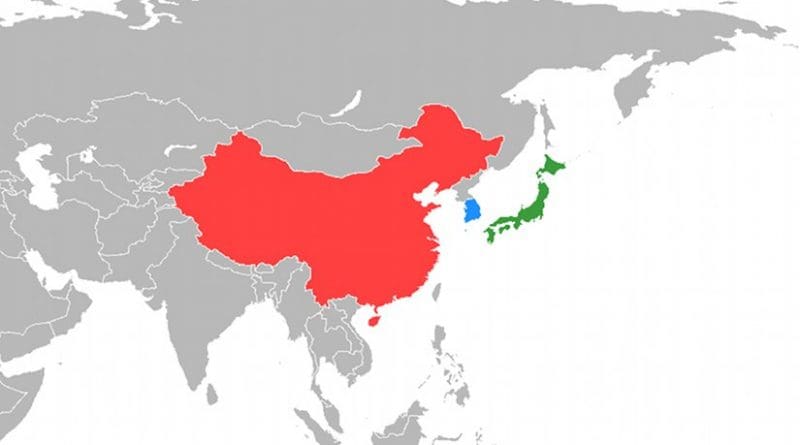China-Japan-South Korea: Takeaways From The Trilateral Summit – Analysis
By IPCS
By Ateetmani Brar*
On 01 November 2015, Chinese Premier Li Keqiang, Japanese Prime Minister Shinzo Abe and South Korean President Park Geun-hye attended their sixth trilateral meeting, in Seoul, South Korea, This meeting came after a three-year hiatus that began in 2012 when talks were suspended due to rising disagreements on matters of historical and territorial issues.
This trilateral mechanism was introduced in 1999 as a derivate of the 10-member Association of Southeast Asian Nations plus China, Japan and South Korea as a crucial and integral part of East Asian cooperation. The annual leaders’ meetings was launched in 2008, outside the 10+3 framework.
The recently concluded summit can be viewed as a positive development among the three East Asian nations. It set the platform for the first official meeting between Abe and Park. The heads of government had not had a formal meeting since they took office in 2012 and 2013 respectively, due to differing views on territorial and wartime history issues. Abe and Chinese President Xi Jinping had their fifth meeting after brief meetings at different fora in September and October 2013.
China-Japan-South Korea Free Trade Agreement
One key discussion during the summit was regarding the China-Japan-South Korea Free Trade Agreement (FTA) – where the leaders emphasised on the significance of an early ratification. The first discussion on the FTA was held in 2012 during the fifth trilateral summit. Subsequently, a few more rounds of talks did take place, but without any effective outcomes.
It is important to note that approximately 20 per cent of the world’s GDP comes from the economies of China, Japan and South Korea, and their exports account for 17.5 per cent of global trade. If signed, the FTA could prove quite fruitful for the China- Korea-Japan partnership as it will pump up economic growth and contribute towards greater regional integration.
Moreover, this FTA is part of the free trade activity in the region. The other major project is the Regional Comprehensive Economic Partnership (RCEP) between ASEAN and Australia, China, India, Japan, Korea and New Zealand – talks for which are currently ongoing. China has been a key advocate of the RCEP, which is seen as an alternative to the US-led Trans-Pacific Partnership where Japan is already a member and South Korea has shown interest in joining. The talks on the FTA and the RCEP amongst the leaders show that the three nations understand its importance and are looking to engage as soon as possible.
North Korean Nuclear Issue
The second key subject of discussion during the summit was on the North Korea’s nuclear ambitons and activities. All three leaders agreed that a nuclear North Korea is not acceptable to either. Both South Korea and Japan support the US’ position that North Korea should halt its nuclear development program. Even Beijing, which is trying to improve its ties with Pyongyang, has demonstrated a similar stance on the latter’s nuclear advancement, for its own strategic reasons: the more nuclear North Korea becomes, higher the reasons for the US to deploy high-tech military installations in South Korea. China fears that this will lead to increased US intervention in the region making Beijing insecure about its own dominance in the region.
To this end, the leaders also stated that they would try to restart the six-party talks that aim to find a peaceful resolution to the security concerns as a result of the North Korea’s nuclear weapons program. The talks have remained held up for almost seven years now.
Outstanding Bilateral Issues
There was also a discussion on the ongoing maritime disputes in the South China Sea. Chinese Foreign Minister Wang Yi demanded that Japan stay out of maritime disputes in regions that involve Southeast Asian countries such as the Philippines and Vietnam. However, the subject of the discussion switched back to economic issues following this statement. This has been the pattern of this trilateral meeting process, where previously too, matters of political differences were rarely discussed. This time it might be all the more so as in China, premier Li – who led the Chinese delegation – is responsible for economic policies, whereas the security matters are handled by president Xi.
Looking Forward
Although they were no major breakthroughs during the recently-concluded talks, the sixth trilateral summit saw the three nations taking a pragmatist approach, seeking to cooperate more on platforms that are beneficial to all three and not discussing pending issues in much detail. According to analysts, such talks definitely increase trust and mutual prosperity. Will the leaders have the same approach at the seventh trilateral summit scheduled to be held in Tokyo, Japan next year? We will have to wait and watch.
* Ateetmani Brar
Research Officer, IPCS

